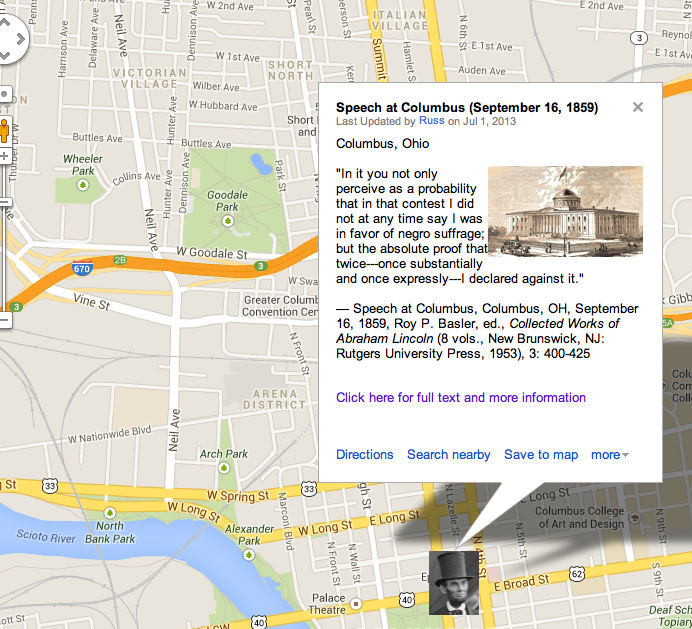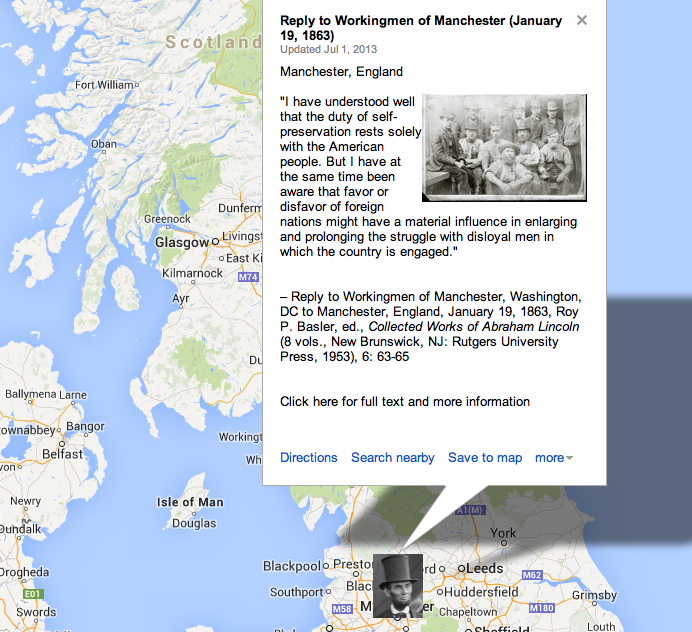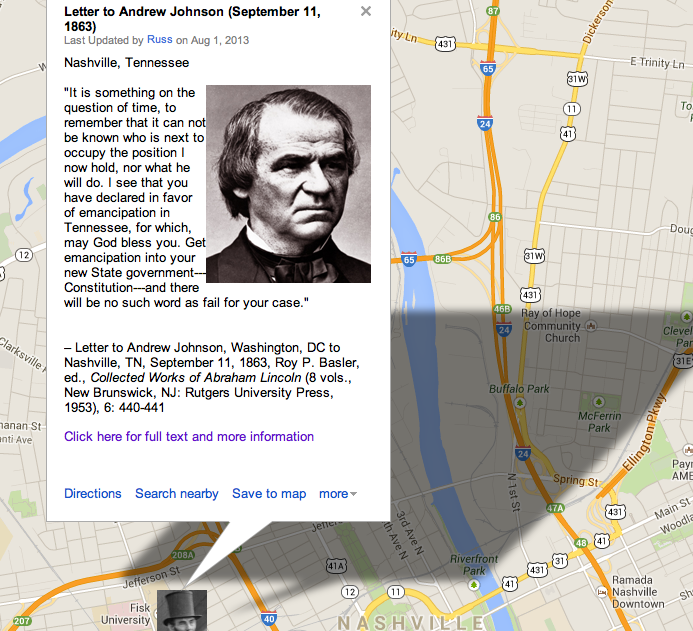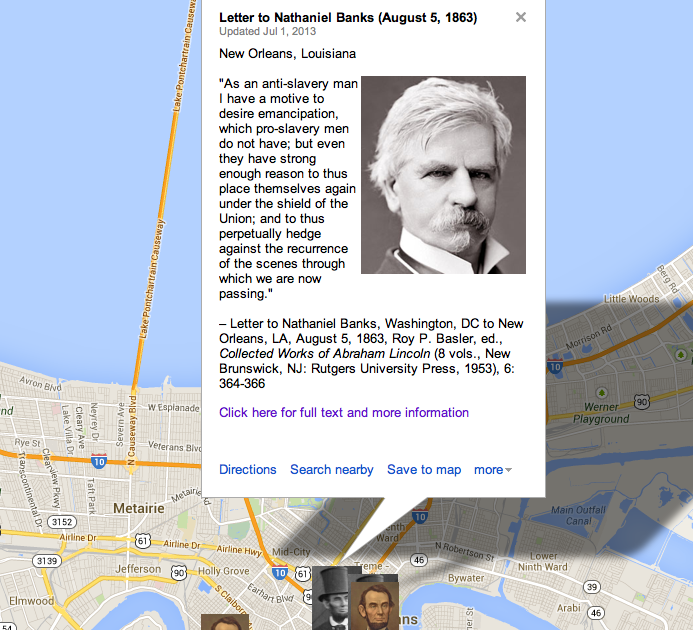Ranking
#106 on the list of 150 Most Teachable Lincoln Documents
Annotated Transcript
“…The Giant himself has been here recently. [Laughter.] I have seen a brief report of his speech. If it were otherwise unpleasant to me to introduce the subject of the negro as a topic for discussion, I might be somewhat relieved by the fact that he dealt exclusively in that subject while he was here. I shall, therefore, without much hesitation or diffidence, enter upon this subject.”
On This Date
HD Daily Report, September 16, 1859
The Lincoln Log, September 16, 1859
Custom Map

View in Larger Map
How Historians Interpret
“Lincoln found Douglas’s activities decidedly threatening. Considering the Little Giant ‘the most dangerous enemy of liberty, because the most insidious one,’ he readily accepted an invitation from the Ohio Republican state central committee to participate in the campaign and thus ‘to head off the little gentleman.’ He did not appear on the same platform with Douglas in Ohio, but his speeches at Columbus, Dayton, Hamilton, and Cincinnati (September 16–17), as well as one he delivered in Indianapolis two days later, were, in effect, continuations of the 1858 debates. For the most part, Lincoln presented arguments that he had advanced during those debates, but he was now freer in his criticisms of Douglas.”
–David Herbert Donald, Lincoln (New York: Simon & Schuster, 1995), 233
“Lincoln refined his nationalist ideology in response to Douglas’s September 1859 essay in Harper’s Magazine. Seeking to justify the policy of popular sovereignty, Douglas contended that the founders had enshrined the principle of local self-government in the Constitution and early territorial law. From this basis, Douglas argued that Congress could confer—but not exercise—powers over a territory’s “domestic affairs,” most notably slavery. Although Lincoln considered the essay a gross perversion of American history and a dangerous philosophical defense of slavery, it gave him another ideal opportunity to define Republican politics by combating Douglas. In a series of speeches given in Ohio, Indiana, and Wisconsin in September, and Kansas in December, Lincoln took issue with Douglas’s historical argument. At Columbus, he developed ideas broached briefly in a speech at Carlinville a year earlier, claiming that the Republicans’ ‘original and chief purpose’ was the ’eminently conservative’ object of preventing slavery’s nationalization. He explained that the Republicans promised ‘to restore this government to its original tone,’ desiring no more in relation to slavery ‘than that which the original framers of the government themselves expected.’ Despite his professed conservatism, these arguments were no more than a freshly minted version of his ultimate extinction doctrine. After all, he maintained that the founders had intended freedom’s nationalization. He observed that the Constitution’s authors had avoided the words ‘slave or slavery’ because they expected slavery’s extinction, and he argued that passage of the Northwest Ordinance evinced the founders’ intention to slowly kill it. Lincoln built on this argument by fusing antislavery nationalism to the interests of free society. He pointed out that Indiana’s settlers unsuccessfully petitioned the government at an early date to suspend the antislavery provision of the Northwest Ordinance, and he argued that Ohio, Indiana, and Illinois would all likely have become slave states had the Ordinance not warded off slaveholders. As proof, he observed that slavery now flourished on one side of the Ohio River but not on the other. The nation’s history thus demonstrated that law, rather than climate, determined slavery’s spread. Reasoning from this proposition, Lincoln invoked free labor arguments to demonstrate the need for antislavery law. Comparing the ‘mud-sill’ theory of labor, in which laborers were fixed in their position for life, and free labor, in which laborers accumulated capital throughout their life, Lincoln contended that free labor was a ‘just and generous, and prosperous system, which opens the way for all—gives hope to all, and energy, and progress, and improvement of condition to all.’ To Lincoln, slavery deliberately destroyed the “inspiration of hope” required for ‘human exertion,’ while free labor encouraged men to innovate and excel. Given these considerations, he urged northerners to return to the ideals that served their interests. In his estimation, progress was ‘the order of things’ only in ‘a society of equals.’ Never before had Lincoln so completely conflated northern interests and American nationalism.”
–Graham Alexander Peck, “Abraham Lincoln and the Triumph of an Antislavery Nationalism,” Journal of the Abraham Lincoln Association 28.2 (2007)
NOTE TO READERS
This page is under construction and will be developed further by students in the new “Understanding Lincoln” online course sponsored by the House Divided Project at Dickinson College and the Gilder Lehrman Institute of American History. To find out more about the course and to see some of our videotaped class sessions, including virtual field trips to Ford’s Theatre and Gettysburg, please visit our Livestream page at http://new.livestream.com/gilderlehrman/lincoln
Searchable Text
…The Giant himself has been here recently. [Laughter.] I have seen a brief report of his speech. If it were otherwise unpleasant to me to introduce the subject of the negro as a topic for discussion, I might be somewhat relieved by the fact that he dealt exclusively in that subject while he was here. I shall, therefore, without much hesitation or diffidence, enter upon this subject.
The American people, on the first day of January, 1854, found the African slave trade prohibited by a law of Congress. In a majority of the States of this Union, they found African slavery, or any other sort of slavery, prohibited by State constitutions. They also found a law existing, supposed to be valid, by which slavery was excluded from almost all the territory the United States then owned. This was the condition of the country, with reference to the institution of slavery, on the 1st of January, 1854. A few days after that, a bill was introduced into Congress, which ran through its regular course in the two branches of the National Legislature, and finally passed into a law in the month of May, by which the act of Congress prohibiting slavery from going into the territories of the United States was repealed. In connection with the law itself, and, in fact, in the terms of the law, the then existing prohibition was not only repealed, but there was a declaration of a purpose on the part of Congress never thereafter to exercise any power that they might have, real or supposed, to prohibit the extension or spread of slavery. This was a very great change; for the law thus repealed was of more than thirty years’ standing. Following rapidly upon the heels of this action of Congress, a decision of the Supreme Court is made, by which it is declared that Congress, if it desires to prohibit the spread of slavery into the territories, has no constitutional power to do so. Not only so, but that decision lays down principles, which, if pushed to their logical conclusion—I say pushed to their logical conclusion—would decide that the constitutions of the Free States, forbidding slavery, are themselves unconstitutional. Mark me, I do not say the judge[s?] said this, and let no man say that I affirm the judge[s?] used these words; but I only say it is my opinion that what they did say, if pressed to its logical conclusion, will inevitably result thus. [Cries of “Good! good!”]
Looking at these things, the Republican party, as I understand its principles and policy, believe that there is great danger of the institution of slavery being spread out and extended, until it is ultimately made alike lawful in all the States of this Union; so believing, to prevent that incidental and ultimate consummation, is the original and chief purpose of the Republican organization. I say “chief purpose” of the Republican organization; for it is certainly true that if the national House shall fall into the hands of the Republicans, they will have to attend to all the other matters of national house-keeping, as well as this. This chief and real purpose of the Republican party is eminently conservative. It proposes nothing save and except to restore this government to its original tone in regard to this element of slavery, and there to maintain it, looking for no further change, in reference to it, than that which the original framers of the government themselves expected and looked forward to.
The chief danger to this purpose of the Republican party is not just now the revival of the African slave trade, or the passage of a Congressional slave code, or the declaring of a second Dred Scott decision, making slavery lawful in all the States. These are not pressing us just now. They are not quite ready yet. The authors of these measures know that we are too strong for them; but they will be upon us in due time, and we will be grappling with them hand to hand, if they are not now headed off. They are not now the chief danger to the purpose of the Republican organization; but the most imminent danger that now threatens that purpose is that insidious Douglas Popular Sovereignty. This is the miner and sapper. While it does not propose to revive the African slave trade, nor to pass a slave code, nor to make a second Dred Scott decision, it is preparing us for the onslaught and charge of these ultimate enemies when they shall be ready to come on and the word of command for them to advance shall be given. I say this Douglas Popular Sovereignty—for there is a broad distinction, as I now understand it, between that article and a genuine popular sovereignty.
I believe there is a genuine popular sovereignty. I think a definition of genuine popular sovereignty, in the abstract, would be about this: That each man shall do precisely as he pleases with himself, and with all those things which exclusively concern him. Applied to government, this principle would be, that a general government shall do all those things which pertain to it, and all the local governments shall do precisely as they please in respect to those matters which exclusively concern them. I understand that this government of the United States, under which we live, is based upon this principle; and I am misunderstood if it is supposed that I have any war to make upon that principle.
Now, what is Judge Douglas’ Popular Sovereignty? It is, as a principle, no other than that, if one man chooses to make a slave of another man, neither that other man nor anybody else has a right to object. [Cheers and laughter.] Applied in government, as he seeks to apply it, it is this: If, in a new territory into which a few people are beginning to enter for the purpose of making their homes, they choose to either exclude slavery from their limits, or to establish it there, however one or the other may affect the persons to be enslaved, or the infinitely greater number of persons who are afterward to inhabit that territory, or the other members of the families of communities, of which they are but an incipient member, or the general head of the family of States as parent of all—however their action may affect one or the other of these, there is no power or right to interfere. That is Douglas’ popular sovereignty applied….
…It is to be a part and parcel of this same idea, to say to men who want to adhere to the Democratic party, who have always belonged to that party, and are only looking about for some excuse to stick to it, but nevertheless hate slavery, that Douglas’ Popular Sovereignty is as good a way as any to oppose slavery. They allow themselves to be persuaded easily in accordance with their previous dispositions, into this belief, that it is about as good a way of opposing slavery as any, and we can do that without straining our old party ties or breaking up old political associations. We can do so without being called negro worshippers. We can do that without being subjected to the jibes and sneers that are so readily thrown out in place of argument where no argument can be found; so let us stick to this Popular Sovereignty—this insidious Popular Sovereignty. Now let me call your attention to one thing that has really happened, which shows this gradual and steady debauching of public opinion, this course of preparation for the revival of the slave trade, for the territorial slave code, and the new Dred Scott decision that is to carry slavery into the free States. Did you ever five years ago, hear of anybody in the world saying that the negro had no share in the Declaration of National Independence; that it did not mean negroes at all; and when “all men” were spoken of negroes were not included?
I am satisfied that five years ago that proposition was not put upon paper by any living being anywhere. I have been unable at any time to find a man in an audience who would declare that he had ever known any body saying so five years ago. But last year there was not a Douglas popular sovereign in Illinois who did not say it. Is there one in Ohio but declares his firm belief that the Declaration of Independence did not mean negroes at all? I do not know how this is; I have not been here much; but I presume you are very much alike everywhere. Then I suppose that all now express the belief that the Declaration of Independence never did mean negroes. I call upon one of them to say that he said it five years ago.
If you think that now, and did not think it then, the next thing that strikes me is to remark that there has been a change wrought in you (laughter and applause), and a very significant change it is, being no less than changing the negro, in your estimation, from the rank of a man to that of a brute. They are taking him down, and placing him, when spoken of, among reptiles and crocodiles, as Judge Douglas himself expresses it.
Is not this change wrought in your minds a very important change? Public opinion in this country is everything. In a nation like ours this popular sovereignty and squatter sovereignty have already wrought a change in the public mind to the extent I have stated. There is no man in this crowd who can contradict it.
Now, if you are opposed to slavery honestly, as much as anybody I ask you to note that fact, and the like of which is to follow, to be plastered on, layer after layer, until very soon you are prepared to deal with the negro everywhere as with the brute. If public sentiment has not been debauched already to this point, a new turn of the screw in that direction is all that is wanting; and this is constantly being done by the teachers of this insidious popular sovereignty. You need but one or two turns further until your minds, now ripening under these teachings will be ready for all these things, and you will receive and support, or submit to, the slave trade; revived with all its horrors; a slave code enforced in our territories, and a new Dred Scott decision to bring slavery up into the very heart of the free North. This, I must say, is but carrying out those words prophetically spoken by Mr. Clay, many, many years ago. I believe more than thirty years when he told an audience that if they would repress all tendencies to liberty and ultimate emancipation, they must go back to the era of our independence and muzzle the cannon which thundered its annual joyous return on the Fourth of July; they must blow out the moral lights around us; they must penetrate the human soul and eradicate the love of liberty; but until they did these things, and others eloquently enumerated by him, they could not repress all tendencies to ultimate emancipation.
I ask attention to the fact that in a pre-eminent degree these popular sovereigns are at this work; blowing out the moral lights around us; teaching that the negro is no longer a man but a brute; that the Declaration has nothing to do with him; that he ranks with the crocodile and the reptile; that man, with body and soul, is a matter of dollars and cents. I suggest to this portion of the Ohio Republicans, or Democrats if there be any present, the serious consideration of this fact, that there is now going on among you a steady process of debauching public opinion on this subject. With this my friends, I bid you adieu.




